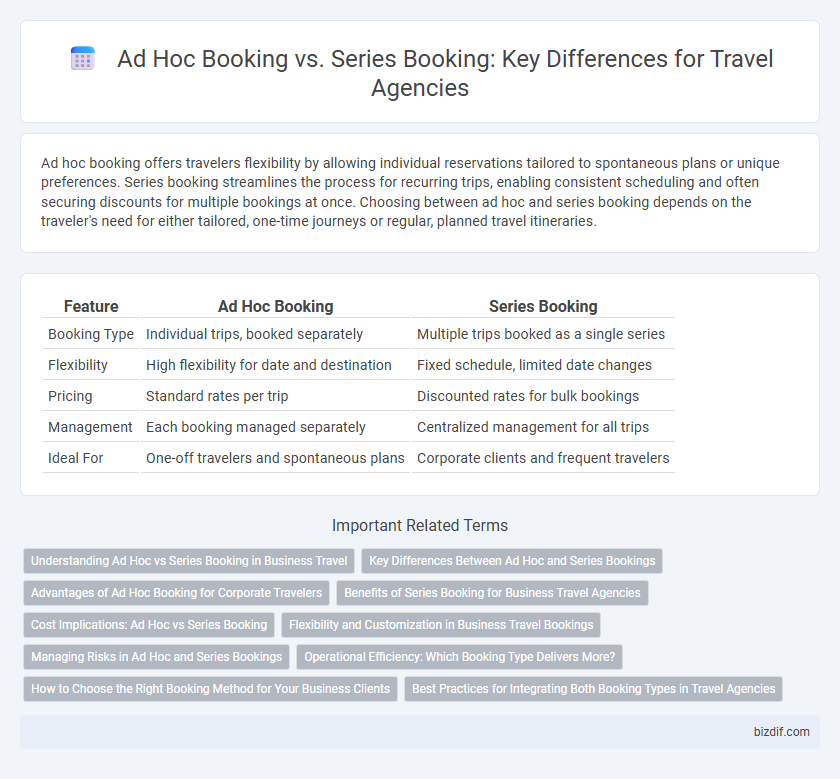Ad hoc booking offers travelers flexibility by allowing individual reservations tailored to spontaneous plans or unique preferences. Series booking streamlines the process for recurring trips, enabling consistent scheduling and often securing discounts for multiple bookings at once. Choosing between ad hoc and series booking depends on the traveler's need for either tailored, one-time journeys or regular, planned travel itineraries.
Table of Comparison
| Feature | Ad Hoc Booking | Series Booking |
|---|---|---|
| Booking Type | Individual trips, booked separately | Multiple trips booked as a single series |
| Flexibility | High flexibility for date and destination | Fixed schedule, limited date changes |
| Pricing | Standard rates per trip | Discounted rates for bulk bookings |
| Management | Each booking managed separately | Centralized management for all trips |
| Ideal For | One-off travelers and spontaneous plans | Corporate clients and frequent travelers |
Understanding Ad Hoc vs Series Booking in Business Travel
Ad hoc booking allows travelers to make individual, spontaneous reservations tailored to immediate needs, offering flexibility for unpredictable schedules. Series booking involves pre-scheduling multiple trips in a sequence, optimizing cost-efficiency and ensuring consistency for recurring business travel. Understanding these booking types helps travel agencies tailor solutions that balance traveler convenience and corporate travel policy compliance.
Key Differences Between Ad Hoc and Series Bookings
Ad hoc bookings refer to individual, one-time reservations tailored to specific travel dates and requirements, allowing flexibility for spontaneous plans. Series bookings involve multiple reservations made in advance for recurring travel dates or events, offering consistency and often negotiated group rates. The key differences lie in their flexibility, pricing structures, and the ability to manage bookings collectively versus independently.
Advantages of Ad Hoc Booking for Corporate Travelers
Ad hoc booking offers corporate travelers unmatched flexibility by allowing individualized trip arrangements tailored to specific business needs and last-minute changes. This booking method reduces the risk of over-committing inventory, ensuring cost-efficiency and avoiding unused reservations. Corporate travel managers benefit from real-time adjustments, simplified expense tracking, and enhanced control over travel budgets.
Benefits of Series Booking for Business Travel Agencies
Series booking offers significant advantages for business travel agencies by streamlining the reservation process for recurring trips, reducing administrative workload, and ensuring consistent pricing and availability. This booking method enables agencies to manage multiple travel dates or destinations under a single contract, enhancing efficiency and improving client satisfaction through customized, predictable itineraries. Leveraging series bookings often results in better negotiation power with suppliers, securing volume discounts and exclusive perks that benefit corporate clients.
Cost Implications: Ad Hoc vs Series Booking
Ad hoc bookings typically incur higher costs due to variable pricing and lack of volume discounts, increasing overall travel expenses for individual trips. Series bookings leverage bulk purchasing power, securing lower rates and fixed prices for multiple trips, resulting in significant cost savings. Companies optimizing travel budgets favor series bookings to reduce per-trip expenses and enhance financial predictability.
Flexibility and Customization in Business Travel Bookings
Ad hoc booking offers unmatched flexibility by allowing business travelers to arrange trips individually based on immediate needs, ideal for dynamic schedules and last-minute changes. Series booking enhances customization by enabling companies to plan multiple trips or recurring travel itineraries with consistent preferences, ensuring streamlined management and cost-efficiency. Both booking types cater to different corporate travel demands, optimizing travel strategies for diverse business requirements.
Managing Risks in Ad Hoc and Series Bookings
Ad hoc bookings allow travel agencies to respond flexibly to individual client needs, reducing the risk of overcommitment but increasing exposure to last-minute cancellations and fluctuating prices. Series bookings provide stability through bulk reservations, securing better rates and availability while mitigating the risk of unutilized seats or accommodations in long-term contracts. Effective risk management in both involves close monitoring of cancellation policies, dynamic pricing adjustments, and strategic client communication to balance demand uncertainty and operational costs.
Operational Efficiency: Which Booking Type Delivers More?
Ad hoc booking offers flexibility for spontaneous travel plans but often requires more administrative time per reservation, reducing operational efficiency. Series booking consolidates multiple trips into a single management process, streamlining scheduling and minimizing repetitive tasks, which significantly enhances operational efficiency for travel agencies. Data shows agencies utilizing series bookings experience up to a 30% reduction in booking-related workload, validating its efficiency advantage.
How to Choose the Right Booking Method for Your Business Clients
Selecting the appropriate booking method depends on the frequency and predictability of your business clients' travel needs. Ad hoc booking suits clients requiring sporadic, one-off trips, offering flexibility and immediate confirmation. Series booking benefits clients with regular, recurring travel schedules, ensuring consistent rates, streamlined invoicing, and simplified itinerary management.
Best Practices for Integrating Both Booking Types in Travel Agencies
Travel agencies should implement integrated booking systems that accommodate both ad hoc and series bookings to maximize operational efficiency and client satisfaction. Leveraging customizable software solutions enables seamless management of spontaneous single-trip bookings alongside recurring multi-trip arrangements, ensuring clarity in pricing and availability. Prioritizing accurate data synchronization and flexible payment options helps streamline workflows, reduce errors, and enhance the overall customer experience.
Ad hoc booking vs Series booking Infographic

 bizdif.com
bizdif.com